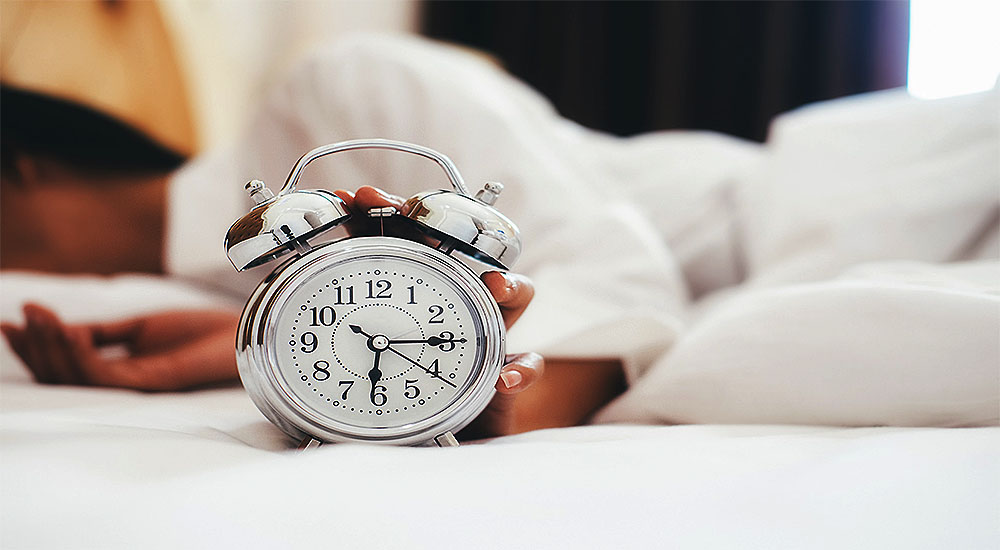What’s your best sleep schedule?

Is early to bed, early to rise healthy for everyone?
In his book, Why We Sleep, Dr. Matthew Walker debunks the old adage that “early to bed, early to rise, makes a man healthy, wealthy and wise.”
In fact, he discusses three sleep windows that are genetically pre-ordained. Dr. Walker calls these your sleep chronotypes.
Your chronotype is defined as the times of day you prefer to sleep as opposed to the times you are most alert or energized.
What’s your preferred sleep schedule? Are you a “lark” or an “owl”?
There are three different chronotypes:
- The lark – larks are early morning birds. This sleep type accounts for 30% of us. You’re in this category if you prefer to go to bed around 9 pm and awaken at 5 am. This is what’s natural and comfortable for you.
- The owl – owls are clearly night-time birds and we frequently refer to humans who like to stay up late as night owls. You’re in this category if you like to get to bed around 1 or 2 am and awaken at 9 or 10 am. This is your natural rhythm and trying to subscribe to anything different just doesn’t suit your awake and sleep cycle. If this is you you’re not alone, a full 30% of us are in this group.
- In-between – the majority of us, though not by a lot, 40%, are in the mid-category. You like to go to bed around 10 or 11 pm and awaken at 6 or 7 am.
Your chronotype is innate and hard-wired
Per sleep research, your chronotype isn’t a choice. You cannot really change from a lark to an owl or vice versa. It’s genetic, innate, and hard-wired into your genes.
Again, per research, you can only push or pull your desired bedtime by about 30-45 minutes; not very much.
Sleep architecture
Within your sleep cycle, which should be 8 hours, you go through 90 minutes cycles. Within each 90 minute cycle, you first go into a deep sleep and then REM sleep. The ratios of each differ, however, as you progress through the night.
In the first several hours of your sleep, you’ll have a more deep sleep. In the second half of your sleep hours, you’ll enjoy more REM sleep.
REM sleep is critical for emotional well-being. As we just reviewed, you’ll get your REM hours satisfied most during the latter part of your sleep cycle.
Why “owls” suffer from more depression, anxiety, and mood swings
This is pretty fascinating stuff. And if you know an owl who is moody, depressed, or anxious, please continue reading.
Owls have it tough often because they are designed to be owls in a world that tends to cater to larks. What I mean is that an owl has a heck of a time getting to sleep before 1 am but often has to awaken at 6 or 7 am.
If this is you, you haven’t just shortchanged your sleep by 1 to 2 hours; you’ve dramatically cut your REM sleep.
This chronic reduction of REM sleep sets you up to suffer from depression, anxiety and mood swings.
Don’t shortchange your sleep
The bottom line is that you need 8 hours of quality sleep that allows for both deep and REM cycles.
Clearly, if you know your chronotype you need to be sensitive to it and try not to fight it if you can.
Failure to get adequate quality sleep shortens your healthspan
If “healthspan” is a new word for you, it’s defined as the span of healthy years you can enjoy. We often speak of lifespan but I think you’d agree that lifespan isn’t much fun if there’s no health. Existing isn’t living.
What happens when you don’t get enough sleep is that you increase your risk of all the metabolic, inflammatory diseases you want to avoid. Including:
- heart disease
- cancer
- type 2 diabetes
- obesity
- Alzheimer’s disease
- early aging
What if you have insomnia?
Insomnia can occur despite best efforts at sleep hygiene. You may very well be allowing enough time for sleep, following a stable schedule, etc. etc., but still, have trouble sleeping.
If you cannot fall asleep rapidly or stay asleep, or if you “sleep” but awaken feeling unrefreshed, you’re likely suffering from insomnia.
The two key systems underlying insomnia are your immune system or your hormonal balance. I’m not saying there are no other factors, but these two systems are frequently a cause.
The good news is that we can help
If your sleep quality is not to the level you desire, we can help.
We have the tools to discover why you’re having sleep issues. It includes specialized testing tailored to you and your unique health history.
Treatment often involves some dietary and lifestyle changes. If that sounds daunting, don’t worry. We will hold your hand through the changes, making each step an easy one.
Do you need help with your health?
We have the diagnostic and testing tools, the clinical experience, and a different medical approach to discovering the root cause of why you have the symptoms that are bothering you. As long as you are ready to make some dietary and lifestyle changes, we can help you. We will "hold your hand" through the changes, step by step, to make each step an easy one. We are located in Clearwater, FL, at 1000 S Ft Harrison, at the corner of Ft. Harrison Ave. and Magnolia St. There is plenty of parking space directly accessible from Ft Harrison. If it is not convenient for you to come to Root Cause Medical Clinic, we offer telehealth/telemedicine consultations to residents of certain states. Call us for details.
Contact us for a Consultation – Call 727-335-0400

Dr. Vikki Petersen DC. CCN
Founder of Root Cause Medical Clinic
Certified Functional Medicine Practitioner
Dr Vikki Petersen is a public speaker, author of two books, several eBooks and creates cutting edge content for her YouTube community. Dr Vikki is committed to bringing Root Cause Medicine and its unique approach to restoring health naturally to the world.
Ask a Doctor
Have a health concern you'd like to speak with a doctor about? Or just want clarity on a subject? Ask Us!


